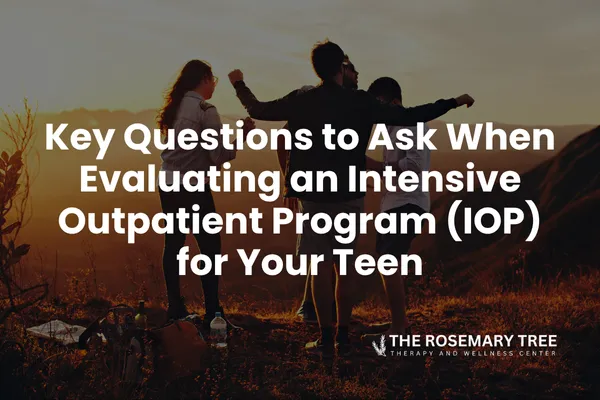
Key Questions to Ask When Evaluating an Intensive Outpatient Program (IOP) for Your Teen
What Does the Program’s Schedule Look Like?
Intensive Outpatient Programs (IOPs) usually meet multiple days per week, often after school hours. Find out how many days and hours are required and whether the sessions occur in the afternoons, evenings, or weekends. A schedule that fits your family’s routine minimizes stress and ensures your teen can balance therapy with school and other responsibilities.
The Rosemary Tree’s adolescent IOP, for example, runs three days per week—Monday and Tuesday from 3:30 PM to 6:30 PM and Thursday from 3:30 PM to 6 PM. This 8.5‑hour-per-week schedule allows teens to attend therapy after school while balancing homework and extracurricular activities. Weekly themes focus on personal goals, emotion regulation, and interpersonal skills. Understanding these details helps you decide if the program’s time commitment and format fit your family’s lifestyle.
Which Therapeutic Approaches Are Used?
Ask about the therapeutic modalities the program employs. Evidence-based therapies—such as Cognitive Behavioral Therapy (CBT), Dialectical Behavior Therapy (DBT), Acceptance and Commitment Therapy (ACT)—often form the foundation of adolescent IOPs. Many programs also integrate creative or experiential modalities like art, nature activities, or movement. Understanding the program’s approach helps you decide if it aligns with your teen’s learning style and interests.
At The Rosemary Tree, clinicians use evidence‑based treatments such as Dialectical Behavior Therapy (DBT), Acceptance and Commitment Therapy (ACT), Cognitive Behavioral Therapy (CBT), expressive art therapy, nature‑based therapy, and restorative family therapy. The program also blends clinical techniques with creative modalities—teens participate in art, nature walks, animal interactions, play, music, breathwork, cooking, and wellness activities—making therapy engaging and experiential. These approaches can help teens build emotional regulation and social skills while enjoying the process.
How Is the Program Tailored to Adolescents?
Teens have unique developmental needs, so it’s important to know how the program adapts its curriculum. Ask whether the program offers separate groups for adolescents or combines age ranges. Inquire about weekly themes or modules that address topics relevant to teens, such as emotion regulation, self-esteem, social skills, and academic stress. Programs that tailor activities to adolescence can better engage participants and foster lasting change.
At intake, Rosemary Tree therapists conduct a comprehensive assessment and create personalized treatment plans. Daily check-ins monitor emotional state and engagement, while weekly team meetings ensure clinicians collaborate on each teen’s care. Progress is communicated to parents through weekly emails detailing themes, activities, questions to engage your child, and specific observations.
How Are Families Involved?
Family involvement is a crucial factor in successful treatment. Find out how often parents or caregivers participate in therapy sessions, educational workshops, or progress meetings. Some IOPs offer separate parent groups and joint family sessions, while others encourage family participation on a weekly or monthly basis. Understanding your role helps you provide meaningful support and stay informed about your teen’s progress.
In Rosemary Tree’s IOP, parents join therapy every Tuesday from 5:00 PM to 6:30 PM, alternating between parent-only skills groups and joint family sessions. The program also schedules family therapy sessions as needed and encourages parents to do their own healing work. Ensure the program you choose values family involvement and offers guidance for supporting your teen at home.
What Qualifications and Experience Do Staff Members Have?
Ask about the credentials and training of therapists, group leaders, and support staff. Ideally, an adolescent IOP is facilitated by licensed mental health professionals (such as LMFTs, LCSWs, LPCs) who have experience working with teens. Inquire whether staff receive ongoing supervision and professional development in adolescent treatment and whether additional specialists (e.g., art therapists, play therapists) contribute to the program.
The Rosemary Tree team includes licensed clinicians and interns completing their master’s degrees (LAC, LPC, LAMFT, LMFT). Staff receive training in expressive art therapy, EMDR, play therapy, sensorimotor therapy, and The Rosemary Tree’s vision and procedures. Multiple staff members are present during sessions to ensure safety and support. Qualified, experienced staff can provide consistent, effective care.
How Are Safety and Crisis Situations Handled?
Safety protocols should be clear and robust. Ask about the initial screening process to determine if an IOP is the appropriate level of care and how staff monitor participants’ emotional and physical well-being. Find out what steps are taken if a crisis arises, and how the program communicates with parents and other professionals during emergencies. Knowing these procedures reassures you that your teen’s safety is a top priority.
The Rosemary Tree conducts a thorough pre‑program assessment to understand each teen’s mental, emotional, and physical health. Licensed therapists and supervisors closely monitor sessions and maintain a respectful environment. For emergencies, the program collaborates with appropriate adults and authorities to ensure your child’s well‑being. Confirm that any program you consider has robust safety protocols.
Does the Program’s Logistics Suit Your Needs?
Consider practical factors like location, transportation, and format. Most IOPs operate in-person to facilitate group interaction and experiential activities. Ask where sessions are held, how long the program runs (many last eight to twelve weeks), and whether virtual options are available if needed. Determine whether the program’s start and end dates align with your teen’s school schedule.
The Rosemary Tree’s IOP is offered in person, utilizing experiential and nature‑based therapies that require hands‑on participation. Sessions are held after school, with the location in North Central Phoenix (1102 E. Missouri Ave.); transportation is the family’s responsibility. Ask about class size, program length (Rosemary Tree’s IOP typically runs for three months, and whether virtual options are available.
What Aftercare and Outcomes Can You Expect?
Inquire about aftercare planning and expected outcomes. A good program will set clear goals—such as improved emotional regulation, strengthened coping skills, better family communication—and provide a roadmap for continued support. Ask how the program measures progress and how frequently parents receive updates. Find out what resources or recommendations are offered once the program ends, such as ongoing individual therapy, family counseling, or support groups.
At Rosemary Tree, clinicians meet weekly to discuss discharge planning and offer personalized recommendations. Teens are encouraged to continue individual or family therapy and may be referred to the Teen DBT group. Understanding expected outcomes is also important; Rosemary Tree focuses on increasing emotional awareness, improving regulation skills, decreasing symptoms, strengthening self‑image, and enhancing family communication. Ask how success is measured and how you’ll be informed of your child’s progress.
How Much Does It Cost, and Is Insurance Accepted?
Cost and coverage vary widely across programs. Ask whether your insurance is accepted and what documentation you’ll need to provide. Inquire about payment plans or financial assistance if needed. Transparent discussions about fees help prevent unexpected expenses and ensure the program fits your budget.
The Rosemary Tree accepts Blue Cross Blue Shield, Aetna, and Cigna insurance and can help verify coverage. Families should provide front and back copies of their insurance card. If insurance doesn’t cover the full cost, ask about payment plans or financial assistance—Rosemary Tree invites families to reach out if they need help. Be sure any program you consider is transparent about fees, insurance billing, and financial support options.
Can You Share Testimonials or Success Stories?
Hearing from other families can provide valuable insight. Ask the program if they can share testimonials or connect you with past participants willing to discuss their experience. Positive feedback from other parents can help you gauge the program’s effectiveness and culture.
By asking these key questions, you’ll gain a comprehensive understanding of any Intensive Outpatient Program you’re considering. The right IOP will align with your teen’s needs, engage your whole family, and set the stage for long-term healing and growth.


